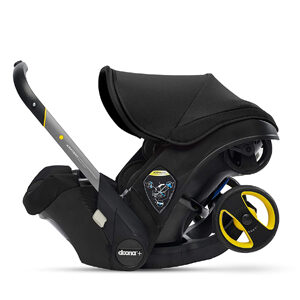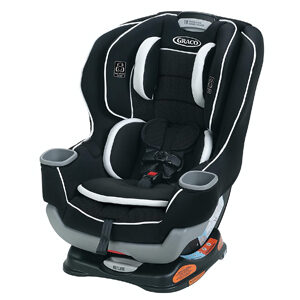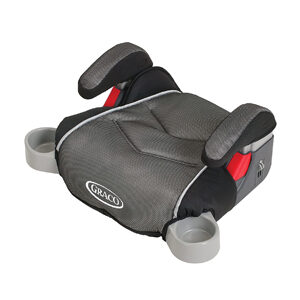What is the Car Seat Law in Kansas?
Kansas Legislature Law Sec. 2. K.S.A. 2000 Supp. 8-1344 (a) reads: "Every driver who transports a child under the age of 14 years in a passenger car on a highway shall provide for the protection of such child by properly in an age- or size-appropriate child passenger restraint system, child booster seat, or a safety seat that meets the federal motor vehicle safety standards."
Kansas State Regulations
Kansas Car Seat Laws Rear-Facing
According to the Kansas Regulations Sec. 2. K.S.A. 2000 Supp. 8-1344 (a) (1), the law requires children who are under 4 years of age or weigh less than 40 pounds to use a child passenger safety restraint system.
The law does not say age, weight, or height requirements on a rear-facing car seat.
However, the Kansas Highway Patrol implement the law rules for children aged under 4 years old. It insists that children under age 1 should always travel in a rear-facing car seat.
The rear-facing car seat can be infant-only seats, convertible, and all-in-one car seats.
The latter two types of car seats have higher height and weight limits for the rear-facing position and allow you to keep your child rear-facing for a longer time, even till to 2 or 3 years of age.
Your child should remain in a rear-facing car seat until they reach the highest height or weight recommended by the car seat’s manufacturer.
This Highway patrol rules are in accordance with the guidelines of NHTSA.
Kansas Forward Facing Car Seat Laws
Forward-facing car seat requirements are mentioned in the Kansas law neither.
According to the Highway Patrol regulations, the best practice is to use a forward-facing car seat with an internal harness once when your child outgrows the rear-facing seat.
Then you should stick to the forward-facing car seat as long as possible when the child is still within the safety limit of the forward-facing car seat.
Most forward-facing car seats feature a weight limit of 65 pounds and a height limit of 49 inches. That typically happens at age 5-7.
What is The Law for Booster Seats in Kansas?
Kansas law says in Sec. 2. K.S.A. 2000 Supp. 8-1344 (b) (2) that children meet below one of the below two standards should use a child booster seat:
- At least 4 years of age but less than 7 years old
- Weigh at least 40 pounds but less than 80 pounds.
The booster seat shall be used as long as possible until your child weighs 80 pounds or is taller than 4 feet 9 inches.
Seat Belt Laws for Child in Kansas
According to the Kansas law Sec. 2. K.S.A. 2000 Supp. 8-1344 (c) (3), children who are more than 80 pounds or older than 7 years old but under the age of 14 must ride with a safety belt.
How about the teenagers who are older than 14 years old?
Actually, all children should use the vehicle’s seat belt for security once they get out of a car seat or when they’re ready to use a safety belt. The same rule can be applied to adults – a seat belt is required for them.
Penalty for Breaking Car Seat Laws in Kansas
Violation of the Child Passenger Safety Law in Kansas is a misdemeanor and requires a mandatory court date in addition to a fine of $60 and court costs.
Kansas Car Seat Laws Apply for
This law applies to all passenger cars designed for carrying fewer than 10 passengers, as defined by KSA 8-1343a.
No exceptions are mentioned in the law, not even the emergency vehicles, school buses, or taxis.
How old does a child have to be to sit in the front seat in Kansas?
Kansas law doesn’t mention the age when your child can sit in the front seat.
However, we can take guidance from the experts and guidelines from NHTSA: keep your child in the rear seat for as long as possible until they’re 13 years of age, because the airbag, no matter inactive or active, is dangerous for children under 13 years old.
Taxi Car Seat Law in Kansas
Age, Weight, Height Requirements in Kansas Law
The Kansas laws provide detailed requirements on age, weight, and height.
Under 4 years of age
Use a federally approved child passenger restraint system
Age 4 through 7, less than 80 pounds in weight
Use a child booster seat
Age 8 to 14
use a safety belt
Further Information
What you Need to Know – Four Car Seat Stages
Best Car Seats to Work with Kansas Laws
Rear-Facing Car Seat for Infants and Small Toddlers

Doona Infant Car Seat Stroller Combo
- Weight Range: 4-35 lbs.
- Height Limit: 32 inches
- Lifespan: 6 years
- Type: Infant
- Stage: 1st
- Suitable for: Birth to 18 months old
More than this Doona car seat and stroller combo, there are a few excellent options available for riding infants in rear-facing. But not all will perform as well as it to allow 1-year-old infants to face the back for this long time, Chicco KeyFit 30 for example, features a low 30-lb weight limit that might not go through the first year.
Forward-Facing for Big Toddlers and Preschoolers

Graco Extend2Fit
- Weight Range: 4-50 lb. (RF) & 22-65 lb. (FF)
- Height Limit: 32 in. (RF) & 49 in. (FF)
- Lifespan: 10 years
- Type: Convertible
- Stage: 1st, 2nd
- Suitable for: Birth to 7 years old
This convertible car seat is great enough to meet the parent’s need to ride their kids in the rear- and front-facing for a longer time. It features 50-lb rear-facing weight limit to be one of the best rear-facing car seats for 2 years old.
When using it facing front, the 65-lb weight limit makes it go through the preschool ages – 3 years old, 4 years old, and 5 years old.
Booster Seats for Big Kids

Graco TurboBooster Backless Booster
- Weight Range: 40-100 lb.
- Height Limit: 43-57 in.
- Lifespan: 10 years
- Type: Booster
- Stage: 3rd
- Suitable for: 4-10 years old
The Graco TurboBooster is the most popular and best budget car seat to meet the State Law to ride older children, six or seven years old, or even bigger. While six years of age is relatively younger than other states’ eight years of age requirement, it’s sooner for Alabama children to get rid of a car seat.
Resources
- Kansas Legislature Law on Child Restraint System.
- Kansas Highway Patrol on Child Passenger Safety
